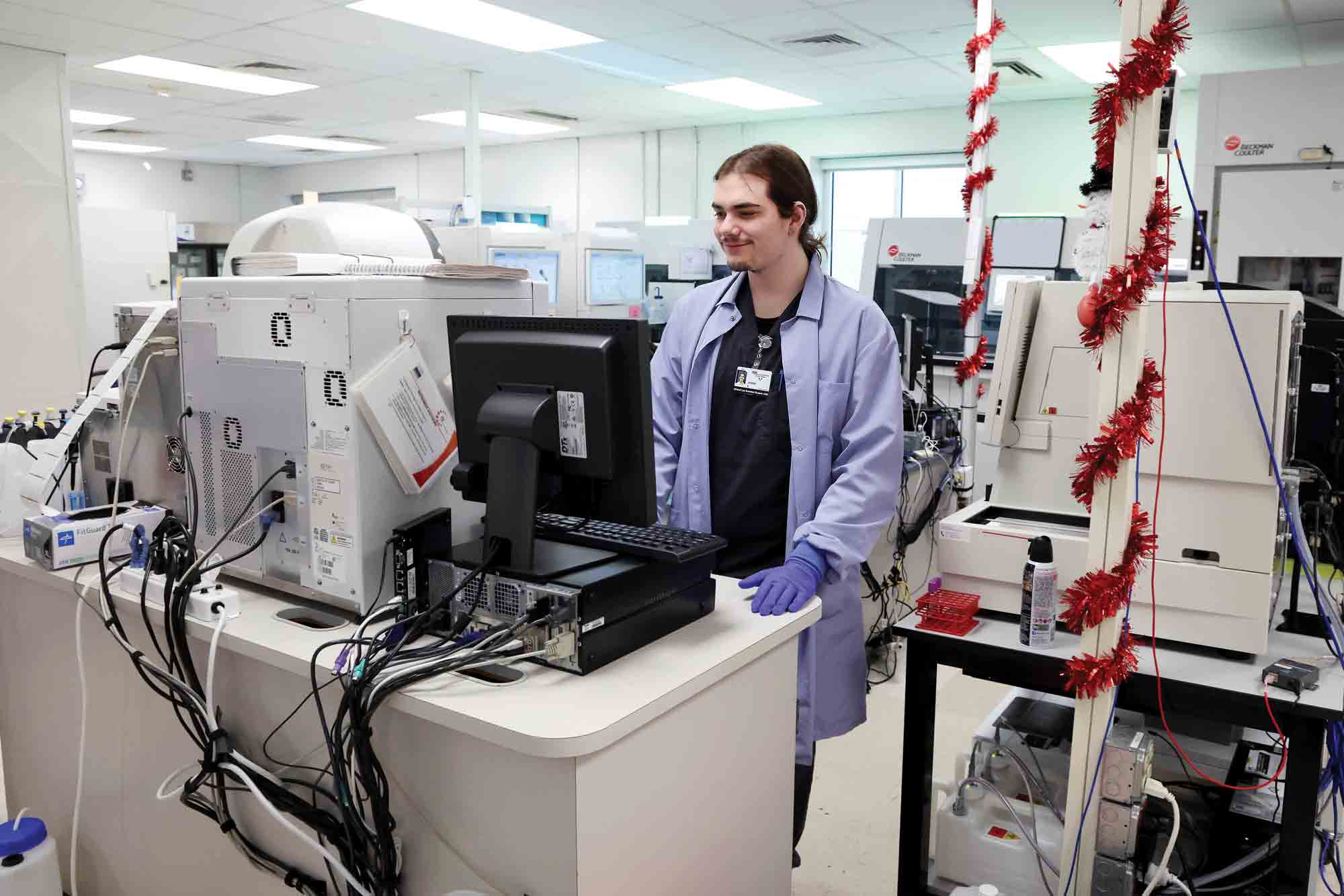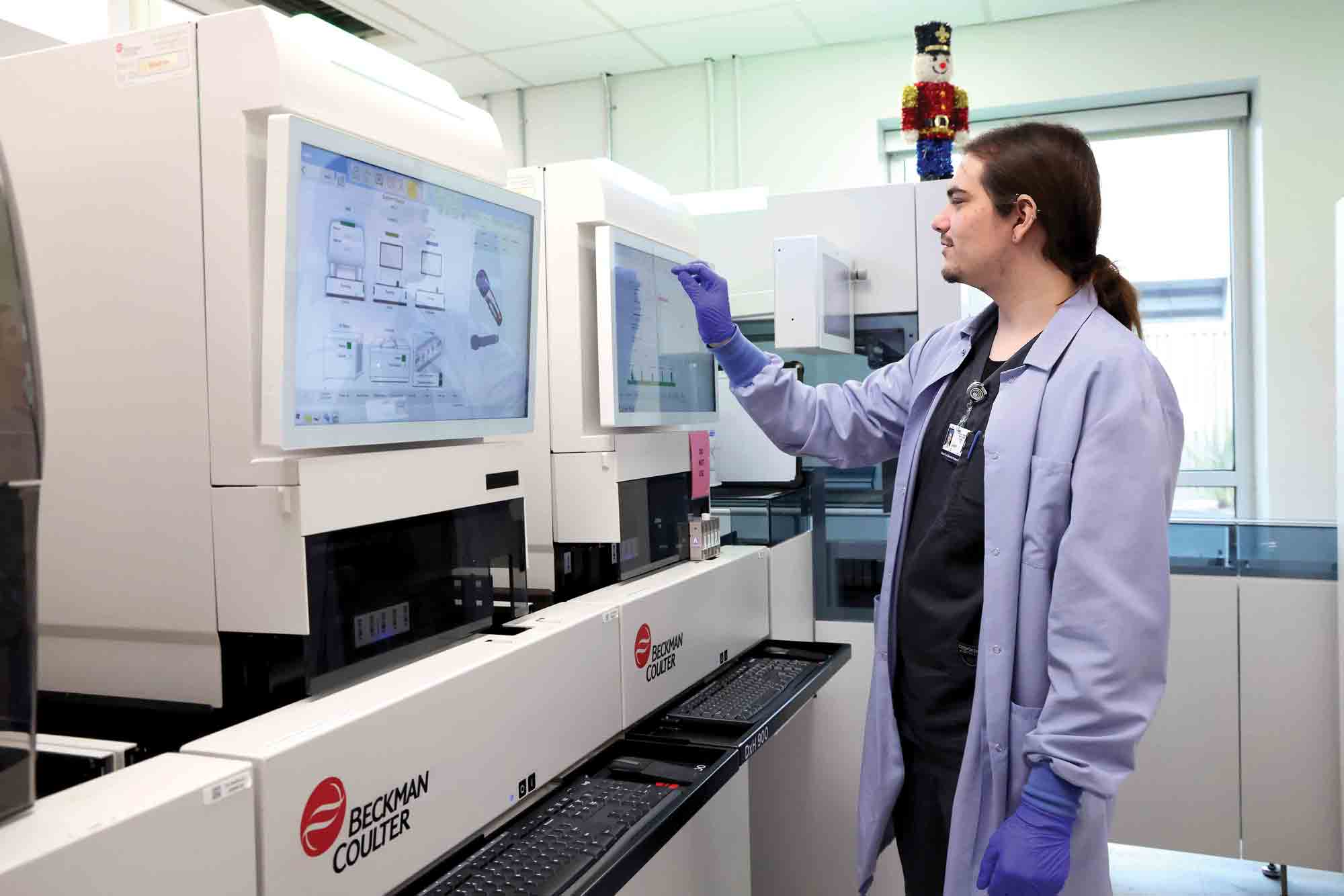
CSUCI ’24 B.S. Biology alum Jason Evans and current CLS student,
works in a lab at Community Memorial Hospital.
By Daisy Ratzlaff
As the demand for skilled healthcare professionals continues to rise, CSUCI students like Karen Henriquez are stepping into the spotlight, ready to make a difference. A graduate of the Clinical Laboratory Sciences (CLS) program, Henriquez shows how the program, in partnership with five local area hospitals—Los Robles Regional Medical Center in Thousand Oaks, Adventist Health Simi Valley in Simi Valley, St. John’s Regional Medical Center in Oxnard, and Community Memorial Hospital and Ventura County Medical Center in Ventura—prepares aspiring Clinical Laboratory Scientists to meet the urgent needs of the healthcare workforce.
“I’ve always been very interested in microbiology,” said Henriquez, who joined the program after receiving a bachelor's degree in biology from a nearby university. “The CLS program was very good at teaching, and I liked that it was close by.”
Henriquez’s journey began in Fall of 2023 with a specific goal in mind: to follow her passion and become a vital part of the healthcare system. Throughout her 52-week internship at Los Robles Regional Medical Center, Henriquez worked side-by-side with an experienced clinical lab scientist, gaining invaluable insights into the daily operations of hospital laboratories.
“I really liked identifying bacteria,” she said. “I would test myself and most of the time I got it right. It was fun to challenge myself.”
During her internship, Henriquez rotated through various departments, including hematology, urinalysis, blood bank, and microbiology.
“It was a lot of work, a lot of studying on your own,” she said. "You really have to put in the work, but everyone was really nice and willing to help.”
The comprehensive training, which involved four days of work at the hospital and one day a week of review classes with CSUCI faculty, not only boosted her confidence but also her commitment to a career in clinical laboratory science. She now works as a Laboratory Technician at Hollywood Presbyterian Medical Center in Los Angeles.
 Evans works in a lab at Community Memorial Hospital.
Evans works in a lab at Community Memorial Hospital.
“The partnership with local hospitals is critical,” explained Amy Denton, the program’s coordinator. “One of the things that is important about this program is, the hospital staff are the ones that do 90% of the work. They are the ones who train the students, teach them how to use the instrumentation, and test them on their skills.”
With the hands-on mentorship provided by hospital staff, students are well-prepared to pass their licensing exams and step into their roles as Clinical Lab Scientists. After completing their training, students become eligible to take one of three state-approved licensing exams, which, upon passing, grant them the license needed to practice as a CLS.
“We often refer to it as a 52-week interview. We get to know the student and they get to know us,” said Beth Marsing, the director of Laboratory Services at Community Memorial Healthcare in Ventura. “Our students do not just observe testing processes, they get to see real-life scenarios and situations, so they can use those experiences throughout their laboratory career. Our expectation is that by the end, the student could work side-by-side with our staff.”
Since its launch in the 2016-2017 academic year, thanks to the vision of prior Provost Dawn Newman, the CLS program has attracted over 100 applicants annually. Yet only a maximum of 10 students can be accepted each year due to the limited capacity of each hospital’s laboratories, which can only accommodate one to two students. CLS certification can only be fulfilled within a hospital laboratory setting, not a university lab.
Denton highlighted the majority of students who have graduated from the program have secured employment, underscoring the strong demand for qualified clinical laboratory scientists in California's healthcare system.
“This program has a really high rate of getting students into the workforce because it trains them to do the clinical lab work,” she said. “A physician does the final sign off, but they do the tests. Other lab assistants can’t work independently. A CLS can, so they are in demand.”
Marsing emphasized the importance of the program especially as hospital staff retire and the population ages.
“The laboratory field is in a critical shortage as we are seeing more people retiring than we are seeing coming into the field,” she said. “The program helps ensure we continue having potential new employees as our staff begin to retire and cut back on their hours.”
Reflecting on the program, Henriquez said that it has truly prepared her to provide patient care in the ever-evolving landscape of healthcare.
“I still use all of what I have learned,” she said. “The program made me know more, and showed me to be more aware of details, because in the end patients depend on you. So, you need to double- and triple-check everything.”
To learn more about CSUCI’s post-baccalaureate Clinical Laboratory Sciences certificate program visit ext.csuci.edu/programs.
